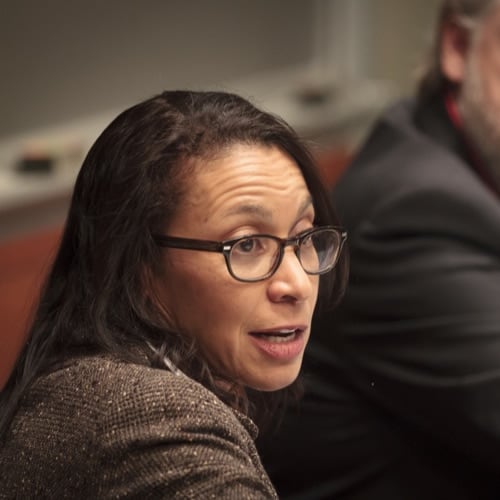

ReImagine Appalachia’s Faith in Action group organized a webinar this past Spring entitled Environmental Justice for All: Ensuring Equity and Benefits Across Our Most Climate-Impacted Communities. The webinar highlights the numerous tools and initiatives available that have the potential to bring substantial funding to Appalachian communities and drive positive change. However, it’s crucial for individuals, as well as organizations, to understand the specifics of these initiatives and tools in order to best benefit their communities.
Our distinguished panel of speakers included:

Amani Reid
Formerly of ReImagine Appalachia and now PA DEP Office of Environmental Justice

Bishop Marcia Dinkins
Black Appalachia Coalition / Ohioans for Sustainable Change

Angus Welch
Environmental Protection Agency

Felecia Bute
Climate Reality Project Pittsburgh
Understanding Environmental Justice:
While equality assumes that everyone receives the same support and equal treatment regardless of their individual needs, and equity ensures that individuals receive personalized support tailored to their specific needs, Environmental Justice goes a step further. By understanding that these issues impede civil rights, Environmental Justice addresses the underlying causes of inequity and removing systematic barriers.
In order to effectively approach Environmental Justice, we must dismantle the colonized narrative of Appalachia and center solutions around the lived experiences of marginalized Appalachians. All of our voices must be heard. Regardless of faith, we all have the belief that we hold to be true; we must work from a place of belief so that we can fight relentlessly for a better, more just world.

The Justice40 Initiative and The Climate and Economic Justice Screening Tool (CEJST):
The Biden Administration has introduced the American Rescue Plan (ARP), a federal initiative to deliver funds directly to Americans during the pandemic, and the Inflation Reduction Act (IRA), a federal program designed to provide clean energy tax incentives and investment programs aimed at developing a strong green economy, both of which have allocated a great deal of money toward communities that suffer environmental injustice.

-Bishop Marcia Dinkins
Black Appalachian Coalition
Justice40, a government-wide initiative defined under Executive Order 14008, seeks to deliver 40% of the overall benefits from investments in climate, clean energy, and related areas to marginalized, underserved, and pollution-burdened communities. While the focus is on directing 40% of the benefits specifically toward disadvantaged communities, the remaining 60% of additional funds offer an opportunity for Environmental Justice grants that can also be utilized to benefit communities.
The Climate and Economic Justice Screening Tool (CEJST) helps identify disadvantaged communities by inputting publicly available data sets into an interactive map.

This incredible tool categorizes the burdens of climate change, energy, health, housing, legacy, water and wastewater, pollution, transportation, waste, and workforce development across geographical areas across the country, including Appalachia. CEJST works by highlighting areas on a map that meet these criteria or that meet one of these criteria, and it serves as a valuable resource for communities to understand if they fall within the Justice40 criteria. While qualifying under Justice40 can potentially help in acquiring grant funding, you can still apply for funding without meeting Justice40 criteria through CEJST.
Funding Opportunities for Environmental Justice:
Two key funding programs were highlighted in this webinar. Though the deadlines for this program have passed, please check with your local municipality or county economic development office to see if your local government has applied or been awarded with this funding. While the 2023 deadline has already passed, there should be another chance to apply in 2024.
Environmental Justice Collaborative Problem Solving Program
Provides $30 million in total funding with awards of $500,000 per organization.
Environmental Justice Government to Government Program
Offers $70 million in total funding, with $1 million per award over a three-year period, focusing on partnerships.
While these programs may be closed to applicants at this point in time, the Inflation Reduction Act is slated to introduce over $2 billion in funding opportunities in the future. Now is the time to start thinking about how your community would like to apply for and utilize these funding opportunities. While the 2023 deadline has already passed, there should be another chance to apply in 2024. For more information about these exciting programs, check out our blog post and watch this video by the EPA!
In addition, the Environmental Justice Thriving Communities Technical Assistance Centers (TCTAC) were discussed in the webinar. For more information, please read below. You can also reach out to Jaboc Burney at [email protected], Esther Sosa at [email protected], and learn more about the 17 centers by clicking here.
The EPA has selected 17 Environmental Justice Thriving Communities Technical Assistance Centers (EJ TCTACs) in partnership with the U.S. Department of Energy that will receive $177 million to help underserved and overburdened communities across the country. Each of the technical assistance centers will receive at least $10 million to remove barriers and improve accessibility for communities with environmental justice concerns. With this critical investment, these centers will provide training and other assistance to build capacity for navigating federal grant application systems, writing strong grant proposals, and effectively managing grant funding.
In addition, these centers will provide guidance on community engagement, meeting facilitation, and translation and interpretation services for limited English-speaking participants, thus removing barriers and improving accessibility for communities with environmental justice concerns. Each of the technical assistance centers will also create and manage communication channels to ensure all communities have direct access to resources and information.
The Technical Assistance Centers have now been announced and the following are part of our four-state region. You can find more information about the Environmental Justice Thriving Communities Technical Assistance Centers Program here.
National Wildlife Federation (University of Maryland’s (UMD) Center for Community Engagement, Environmental Justice and Health (CEEJH) and Environmental Finance Center (EFC), Morgan State University, West Virginia State University, Centro De Apoyo Familiar, South Baltimore Community Land Trust, Virginia Environmental Justice Collaborative, Overbrook Education Center, Sussex Health & Environment, Network/Sentinels of Eastern Shore Health). The National Wildlife Federation Technical Assistance Center covers Pennsylvania and West Virginia.
Research Triangle Institute (RTI International) (North Carolina Central University (academic/Minority-serving Institution [MSI]), University of Memphis (academic), University of South Carolina (academic), University of Georgia (academic), Florida Agricultural and Mechanical University (academic/MSI), Alabama Agricultural and Mechanical University (academic/MSI), University of Kentucky (academic), Jackson State University (academic/MSI), Environmental Protection Network (non-profit)). The National Wildlife Federation Technical Assistance Center covers Pennsylvania and West Virginia. The Research Triangle Institute Technical Assistance Center covers Kentucky.
Blacks in Green (BIG) (The Midwest Tribal Energy Resources Association (MTERA), Black Environmental Leaders (BEL), Environmental Health Watch (EHW), The School of Public Health, University of Illinois, Chicago, The Smart Energy Design Center, University of Illinois at Urbana-Champaign (SEDAC)) The Blacks in Green (BIG) Technical Assistance Center covers Ohio.

-Bishop Marcia Dinkins
Black Appalachian Coalition
To create meaningful change in our communities, we must recognize the power of collaboration, faith, and activism. By engaging with the Justice40 Initiative and utilizing tools like CEJST, we can advocate for environmental justice and access funding that addresses the unique needs of our communities. It is essential to continue improving CEJST, participate in conversations, like this webinar, and apply for funding to solve Appalachian problems the Appalachian way.
You can watch the entire presentation and check out the resources provided in the webinar here!
